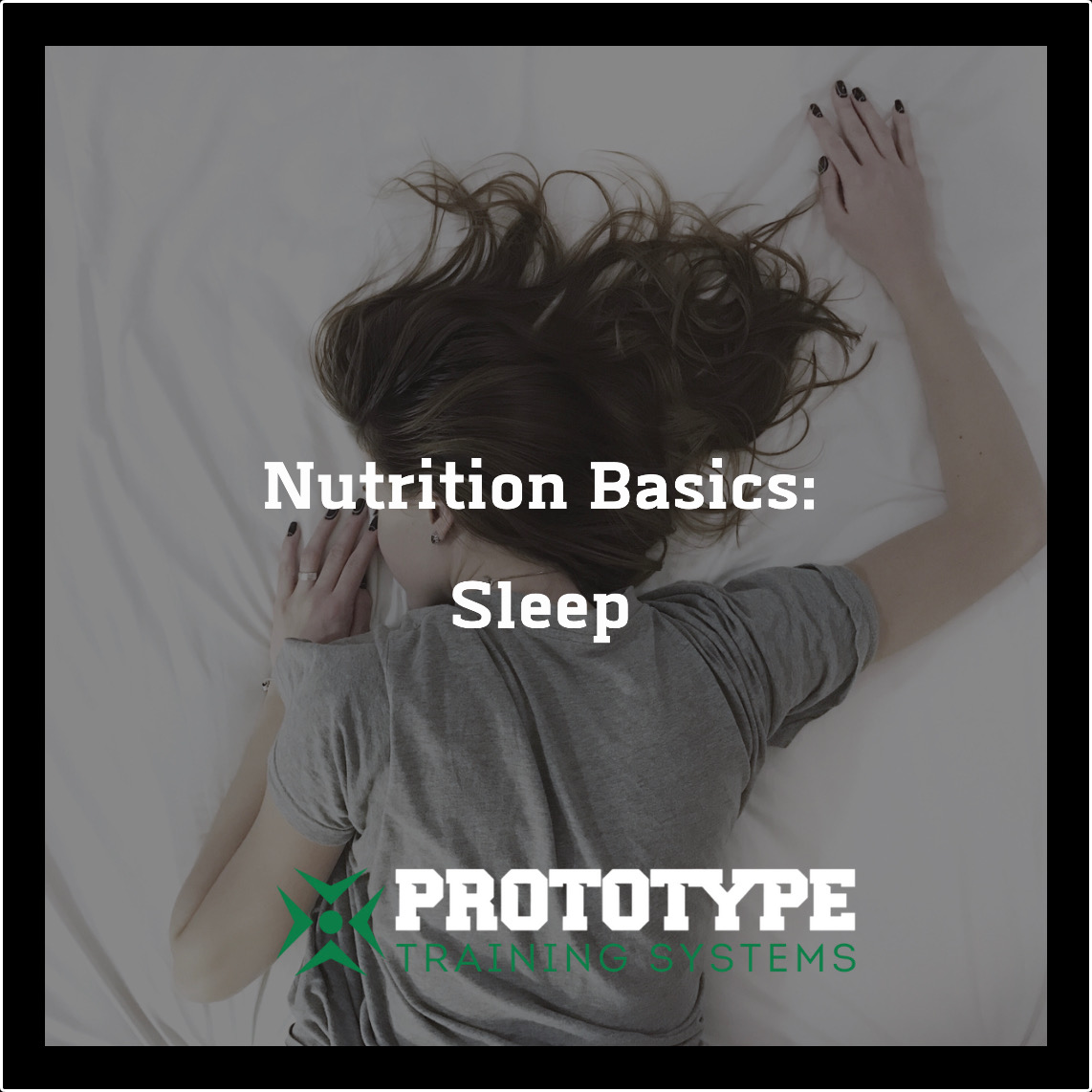Nutrition Basics: Sleep
Nutrition Basics: Sleep
By: Jon Collette (Prototype Nutrition Coach)

In part 6 of our nutrition series, Nutrition Basics , I will be going in-depth about the importance of sleep on the mind, body, and your productivity.
This series has been ALL ABOUT Nutrition (what we put in our body), so how does sleep fit into a nutrition series?
Well, we all know that every single person in the world needs sleep in order to perform. So it’s really important to make sure we are getting an adequate amount. The better you sleep, the better recovered you are, the more energy you have to be productive and the more energy you have for a more productive workout.
Even though we all need sleep, the required amount of sleep is going to vary depending on your age and activity level. For example, the younger you are the more sleep you’ll need because you’re body is still growing. That’s why babies sleep so much!
What’s the recommended amount of sleep?
(Source: The National Sleep Foundation)
Age
Hours Needed
May be appropriate
Newborn to 3 months old
14 – 17 hrs
11 – 19 hrs
4 to 11 months old
12 – 15 hrs
10 – 18 hrs
1 to 2 years old
11 – 14 hrs
9 – 16 hrs
3 to 5 years old
10 – 13 hrs
8 – 14 hrs
6 to 13 years old
9 – 11 hrs
7 – 12 hrs
14 to 17 years old
8 – 10 hrs
7 – 11 hrs
Young adults (18 to 25 years old)
7 – 9 hrs
6 – 11 hrs
Adults (26 to 64 years old)
7 – 9 hrs
6 – 10 hrs
Older adults (65+)
7 – 8 hrs
5 – 9 hrs
| Age |
Hours Needed |
May be appropriate |
| Newborn to 3 months old |
14 – 17 hrs |
11 – 19 hrs |
| 4 to 11 months old |
12 – 15 hrs |
10 – 18 hrs |
| 1 to 2 years old |
11 – 14 hrs |
9 – 16 hrs |
| 3 to 5 years old |
10 – 13 hrs |
8 – 14 hrs |
| 6 to 13 years old |
9 – 11 hrs |
7 – 12 hrs |
| 14 to 17 years old |
8 – 10 hrs |
7 – 11 hrs |
| Young adults (18 to 25 years old) |
7 – 9 hrs |
6 – 11 hrs |
| Adults (26 to 64 years old) |
7 – 9 hrs |
6 – 10 hrs |
| Older adults (65+) |
7 – 8 hrs |
5 – 9 hrs |
OK, great. We understand we need sleep (we’ve all felt it when we don’t) but how does sleep impact the body as a whole?
OK, great. We understand we need sleep (we’ve all felt it when we don’t) but how does sleep impact the body as a whole?
Sleep deprivation can have negative impacts on your:
-
Immune system
-
Memory
-
Productivity
-
Decision making
-
Creativity
-
Stress
-
Depression
-
Increased appetite
-
Loss of lean muscle
Sleep deprivation can have negative impacts on your:
-
Immune system
-
Memory
-
Productivity
-
Decision making
-
Creativity
-
Stress
-
Depression
-
Increased appetite
-
Loss of lean muscle
How do I know if I’m getting enough sleep?
There’s a difference between going to bed on time and actually getting adequate sleep. In other words, time in bed does not mean you are getting that much time sleeping. There’s a lot of things we do leading up to our bedtime that can impact our sleep quality. In addition, there are things that can cause disturbances in your sleep cycle that cause you to wake up. Here are some things to avoid to improve your sleep quality:
-
Caffeine later in the afternoon
-
Looking at Blue lights before bedtime (cell phones,tv, tablets)
-
Alcohol
-
Too much water
-
Unresolved stress
-
Lack of exercise
There’s a difference between going to bed on time and actually getting adequate sleep. In other words, time in bed does not mean you are getting that much time sleeping. There’s a lot of things we do leading up to our bedtime that can impact our sleep quality. In addition, there are things that can cause disturbances in your sleep cycle that cause you to wake up. Here are some things to avoid to improve your sleep quality:
-
Caffeine later in the afternoon
-
Looking at Blue lights before bedtime (cell phones,tv, tablets)
-
Alcohol
-
Too much water
-
Unresolved stress
-
Lack of exercise
How do I improve my sleep quality?
-
Limit caffeine after 1 pm.
There are traces of caffeine in certain foods (so you might not be able to completely avoid it) but monitoring intake is ideal. Caffeine stays in the system for up to 8 hours so caffeinated drinks like coffee, tea, sodas should be reduced. Foods like chocolate also can have caffeine in them (so watch out!).
-
Put your cell phone on do not disturb 30 minutes before bedtime.
This is a strategy to not be tempted by notifications and to help you cut down on your screen time leading up to bed. The blue lights given off by these device’s impacts are sleep because it throws our melatonin levels off and impacts your natural circadian rhythm. In other words, stop looking at your phone in bed!
-
Turn the TV off 30 minutes before bed and have a nightly routine (do the dishes, pack your lunch, brush your teeth)
Routine is important for many things we’ve discussed through this series but with sleep, it helps give your body a pattern that you’re calming down. This also pulls you away from screens.
-
If you’re going to have alcohol, limit the amount and try to have a gap before you settle down for bed.
Alcohol has no nutritional value and studies have shown that alcohol impacts your recovery and we get most of our recovery done while we rest. In addition, alcohol can contribute to sleep disturbances (getting up in the middle of the night to go to the bathroom for example), which impacts your sleep quality.
-
Meditate, journal, stretch, talk to your spouse about how you’re feeling/stress.
Do you want to sleep better? Clear your mind before bed so you can help reduce restless nights and subconscious worries while you sleep. Meditation, journaling, and stretching can help you relax and put you in a better mindset before you go to bed.
-
Start working out regardless of how busy you are.
Exercise is extremely important for consistent sleep. Moving your body requires energy and recovery from training. If your body needs further recovery you are more likely to have a better night’s sleep. In addition, this is one of the best ways to reduce stress and anxiety.
Thank you for following along with this blog series on executing the basics. If you learned anything please shoot me an email at Jon@prototypetraining.com. If you need help or want a more personalized plan for your goals, we are here to help.
Thank you for following along with this blog series on executing the basics. If you learned anything please shoot me an email at Jon@prototypetraining.com. If you need help or want a more personalized plan for your goals, we are here to help.
Want to book a FREE CONSULT? Click this link and let’s get started!
The post Nutrition Basics: Sleep appeared first on Prototype Training Systems.
Previous Blogs


Climb to New Heights
Prototype Training Systems is more than a gym - it is a lifestyle. Join us today!


